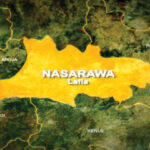By Joshua Odeyemi, Idowu Isamotu & Dalhatu Liman
About 4,000 Nigerian students are stranded in Sudan following the ongoing crisis there, Daily Trust learnt.
The president of the National Association of Nigerian Students, Sudan (NANSS), Abubakar Babangida, disclosed this to Daily Trust yesterday.
This is just as the Nigerian government said it is still consulting on the next line of action regarding evacuation of Nigerians in Sudan.
The government said this in response to the request made by Nigerian students in Sudan.
Police nab suspected cattle rustlers masterminding Benue crisis
Experts canvass support for childhood education
Daily Trust reports that explosions and gunfire resounded in Sudan’s capital Thursday as fighting between the forces of two rival generals showed no signs of abating ahead of festivities marking the end of Ramadan.
Over 300 people have been killed since the fighting erupted Saturday between forces loyal to Sudan’s army chief, Abdel Fattah al-Burhan and his deputy, Mohamed Hamdan Daglo, who commands the paramilitary Rapid Support Forces (RSF).
In a chat with one of our reporters last night, Babangida said there were more than 10,000 Nigerian students currently studying in Sudan.
He, however, said most of them were on holiday, adding that only about 4, 000 of them were left behind.
He said the students, mostly females, were stuck in Sudan at present.
“Statistically, we have more than 10,000 students studying in Sudan but now some are on holiday. Currently, about 3-4000 are stranded,” he stated.
The association had earlier written to the Nigerian government crying that its members were stranded in Sudan with no access to basic needs.
It also said its members had been facing dangerous threats.
“We hereby write, soliciting and yearning for the Nigerian government’s intercession to rescue and send for an immediate evacuation of the Nigerian students that are stuck in the centre of the ongoing war,” the letter written to the Nigerian government read in part.
‘Our lives in danger’
Some of the Nigerian students yesterday cried out that they were trapped in their respective homes and hostels following ongoing clashes in the country.
One of the students, Hussein Musa Yusuf, who spoke to Daily Trust on phone last night, said there had been scarcity of water, food, electricity and other basic amenities since Sunday, April 16.
He said they could not go out in search of basic needs because of ongoing shooting that have claimed civilian casualties.
Yusuf, an indigene of Kano State, added that there is a danger ahead if they are not quickly repatriated because they had no access to health centres and pharmacies.
“Many students are stranded in their hostels and houses without basic needs of life such as food, water and electricity.
“Presently, there is no access to hospitals and pharmacies. There is a risk if they go out because there is shooting and civilian casualties have been recorded,” he said.
When asked whether the Nigerian embassy in Sudan had contacted them for possible repatriation, Yusuf said they had not been contacted as of Thursday apart from the information given to them via a letter that was released on Wednesday.
The letter dated April 19 read, “Pursuant to undoing armed clashes between the Sudan Armed Forces (SAF) and Rapid Support Force (RSF), which commenced on 15th April 2023, the Embassy is passionately appealing to all Nigerian nationals to exercise caution and restrain with respect to the circumstances we found ourselves.
“Be that as it may, the Embassy is in touch with all relevant stakeholders in Khartoum and Abuja respectfully, for protection and well-being of Nigerians in Sudan.
“Similarly, the embassy is making plans for possible evacuation of Nigerians Nationals with approval of the Federal Government of Nigeria as soon as the situation allows it and you will be communicated in due course.
“Consequently, the ambassador enjoined all Nigerian Nationals in Sudan to stay safe and be wary of fake news circulating the social media these trying times. As always, the Embassy will keep a close contact with the leadership of all the Nigerian unions for further consular assistance and updates.”
‘Nigerian gov’t consulting’
Abike Dabiri-Erewa, the Chairman/CEO of Nigerians in Diaspora Commission (NIDCOM), yesterday acknowledged that the commission had received the letter of solicitation by the NANSS for a possible evacuation of students, especially those in Khartoum, the Sudanese capital.
Dabiri-Erewa, in a statement by Gabriel Odu of the Media, Public Relations and Protocol Unit of NIDCOM, expressed concerns about their plights following the escalation of hostilities between the Sudanese army and RSF.
She assured that the National Emergency Management Agency (NEMA), which is in charge of emergency evacuations, was consulting with the Nigerian mission in Sudan and other relevant agencies.
She, therefore, urged all Nigerian Students in Sudan as well as Nigerians living in Sudan to be security conscious and calm.
Meanwhile, when contacted for a response to the request by Nigerian students in Sudan, the Ministry of Foreign Affairs’ spokesperson, Franca Omayuli, said the federal government was working on something, promising to get back to our reporter on the issue.
When asked to give an insight into the federal government’s plan, she said: “I will get back to you.”
However, she did not get back to our reporter at press time.
General Agwai speaks on Sudan crisis
A former Chief of Defence Staff, General Martin Luther Agwai (retd) described the current political turmoil Sudan found itself in as unfortunate, saying that it is not the first time the country was faced with such a crisis.
He told Trust TV yesterday that the powers that be in Sudan want power at all costs so that no one minds grasping it through the barrel of a gun.
According to Agwai, who led one of the biggest peacekeeping operations in the world with approximately 20,000 troops and 6,000 police under his command, said global, regional and especially what’s happening around the Red Sea were the major forces behind the crisis in Sudan.
“That’s why you can see that every group that feels they’re strong enough wants to march on Khartoum and seize power.
“Sudan was actually the largest country in Africa and we thought with the independence of South Sudan, that things would improve. Unfortunately, power play has come into it.
“It’s very clear that it’s going to take a long time to get democracy in Sudan because military rule has been there for so long. And some feel that the easiest way to remain in political power is to use the military.”
He noted that the current situation in the East African country had started for a long time, predating to 2003, which he said had come to play out now.
He added that this was because some Sudanese have gained economic power and military was behind them, hence using the same military to remain in power perpetually, “not really wanting democratic forces to take its course.’’
The retired general also explained that behind the internal challenges in the country, regional challenges and instability around the region were other contributing factors to the crisis.
He recalled an interview he granted the BBC in 2009 when he was leaving Sudan as UNAMID Force Commander.
“I stated that if the situation in Sudan continues the way it’s at that time and if there are no real efforts to go back to the democracy crisis in Sudan, it will continue in the next decade. That was in 2009.
“And after 2019, we’re now seeing a situation that is worse than it’s before,’’ he added.
General Agwai likened the crisis with a situation whereby two captains operating an aircraft. “You know that the aircraft heads for disaster and this is exactly what’s happening in Sudan,’’ he said.
“Also, remember that the military has a longer history than the Rapid Development Force. They are at the centre of activities: they’re at the institutions of government. They’re recognised by everybody. They’ve people who have got some discipline and training to be where they’re. You cannot say the same with the rapid forces.’’
He said Sudan’s military are ‘bunch’ of people picked from all over the place, and they’re only power mongers. “They’ve gained economic power and little military training and discipline; their end product is power.”
He said a similar scenario played out when he was commanding UNAMID where the Justice and Equality Movement (JEM) rebel group went as far as Omdurman, almost getting to the centre to take over the government.




